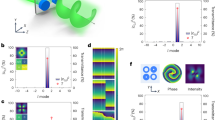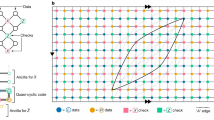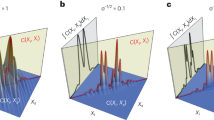Abstract
Entanglement distillation, the purpose of which is to probabilistically increase the strength and purity of quantum entanglement, is a primary element of many quantum communication and computation protocols. It is particularly necessary in quantum repeaters in order to counter the degradation of entanglement that inevitably occurs due to losses in communication lines. Here, we distil the Einstein–Podolsky–Rosen state of light, the workhorse of continuous-variable entanglement, using noiseless amplification. The advantage of our technique is that it permits recovering a macroscopic level of entanglement, however low the initial entanglement or however high the loss may be. Experimentally, we recover the original entanglement level after one of the Einstein–Podolsky–Rosen modes has experienced a loss factor of 20. The level of entanglement in our distilled state is higher than that achievable by direct transmission of any state through a similar loss channel. This is a key step towards realizing practical continuous-variable quantum communication protocols.
This is a preview of subscription content, access via your institution
Access options
Subscribe to this journal
Receive 12 print issues and online access
$209.00 per year
only $17.42 per issue
Buy this article
- Purchase on Springer Link
- Instant access to full article PDF
Prices may be subject to local taxes which are calculated during checkout


Similar content being viewed by others
References
Nielsen, M. & Chuang, I. Quantum Computation and Quantum Information (Cambridge Univ. Press, 2000).
Bennett, C. H. et al. Purification of noisy entanglement and faithful teleportation via noisy channels. Phys. Rev. Lett. 76, 722–725 (1996).
Braunstein, S. L. & van Loock, P. Quantum information with continuous variables. Rev. Mod. Phys. 77, 513–577 (2005).
Reid, M. D. Demonstration of the Einstein–Podolsky–Rosen paradox using nondegenerate parametric amplification. Phys. Rev. A 40, 913–923 (1989).
Weedbrook, C. et al. Gaussian quantum information. Rev. Mod. Phys. 84, 621–669 (2012).
Ralph, T. C. & Lund, A. P. Nondeterministic noiseless linear amplifcation of quantum systems. AIP Conf. Proc. 1110, 155–160 (2009).
Takahashi, H. et al. Entanglement distillation from Gaussian input states. Nature Photon. 4, 178–181 (2010).
Kurochkin, Y., Prasad, A. S. & Lvovsky, A. I. Distillation of the two-mode squeezed state. Phys. Rev. Lett. 112, 070402 (2014).
Bartley, T. J. & Walmsley, I. A. Directly comparing entanglement-enhancing non-Gaussian operations. New J. Phys. 17, 023038 (2015).
Chrzanowski, H. M. et al. Measurement-based noiseless linear amplification for quantum communication. Nature Photon. 8, 333–338 (2014).
Andersen, U. L., Neergaard-Nielsen, J. S., van Loock, P. & Furusawa, A. Hybrid discrete- and continuous-variable quantum information. Nature Phys. 11, 713–719 (2015).
Xiang, G. Y., Ralph, T. C., Lund, A. P., Walk, N. & Pryde, G. J. Heralded noiseless linear amplification and distillation of entanglement. Nature Photon. 4, 316–319 (2010).
Ferreyrol, F. et al. Implementation of a nondeterministic optical noiseless amplifier. Phys. Rev. Lett. 104, 123603 (2010).
Zavatta, A., Fiurasek, J. & Bellini, M. A high-fidelity noiseless amplifier for quantum light states. Nature Photon. 5, 52–60 (2010).
Kosis, S., Xiang, G. Y., Ralph, T. C. & Pryde, G. J. Heralded noiseless amplification of a photon polarization qubit. Nature Phys. 9, 23–28 (2013).
Pegg, D., Phillips, L. & Barnett, S. Optical state truncation by projection synthesis. Phys. Rev. Lett. 81, 1604–1606 (1998).
Babichev, S. A., Ries, J. & Lvovsky, A. I. Quantum scissors: teleportation of single-mode optical states by means of a nonlocal single photon. Europhys. Lett. 64, 1–7 (2003).
Lvovsky, A. I. & Mlynek, J. Quantum-optical catalysis: generating nonclassical states of light by means of linear optics. Phys. Rev. Lett. 88, 250401 (2002).
Mičuda, M. et al. Noiseless loss suppression in quantum optical communication. Phys. Rev. Lett. 109, 180503 (2012).
Ourjoumtsev, A., Dantan, A., Tualle-Brouri, R. & Grangier, P. Increasing entanglement between Gaussian states by coherent photon subtraction. Phys. Rev. Lett. 98, 030502 (2007).
Kumar, R. et al. Versatile wideband balanced detector for quantum optical homodyne tomography. Opt. Commun. 285, 5259–5267 (2012).
Huisman, S. R. et al. Instant single-photon Fock state tomography. Opt. Lett. 34, 2739–2741 (2009).
Vidal, G. & Werner, R. F. Computable measure of entanglement. Phys. Rev. A 65, 032314 (2002).
Pan, J. W., Gasparoni, S., Ursin, R., Weihs, G. & Zeilinger, A. Experimental entanglement purification of arbitrary unknown states. Nature 423, 417–422 (2003).
Ralph, T. C. Quantum error correction of continuous-variable states against Gaussian noise. Phys. Rev. A 84, 022339 (2011).
Eisert, J., Browne, D. E., Scheel, S. & Plenio, M. B., Distillation of continuous-variable entanglement with optical means. Ann. Phys. (Leipz.) 311, 431–458 (2004).
Datta, A. et al. Compact continuous-variable entanglement distillation. Phys. Rev. Lett. 108, 060502 (2012).
Berry, D. W. & Lvovsky, A. I. Linear-optical processing cannot increase photon efficiency. Phys. Rev. Lett. 105, 203601 (2010).
Berry, D. W. & Lvovsky, A. I. Preservation of loss in linear-optical processing. Phys. Rev. A 84, 042304 (2011).
Acknowledgements
The authors thank G. Adesso for discussions and the Russian Quantum Center for support. A.L. is supported by the National Science and Engineering Research Council of Canada and is a fellow of the Canadian Institute for Advanced Research. T.C.R.'s research is funded by the Australian Research Council Centre of Excellence for Quantum Computation and Communication Technology (project no. CE110001027).
Author information
Authors and Affiliations
Contributions
The experiment was conceived and designed by A.E.U., I.F., Y.K., T.C.R. and A.L., and performed by A.E.U., I.F., Y.K., A.A.P. and A.L. The data were analysed by A.E.U., I.F. and A.L. A.E.U., I.F., Y.K., T.C.R. and A.L. contributed to writing the paper.
Corresponding author
Ethics declarations
Competing interests
The authors declare no competing financial interests.
Supplementary information
Supplementary information
Supplementary information (PDF 403 kb)
Rights and permissions
About this article
Cite this article
Ulanov, A., Fedorov, I., Pushkina, A. et al. Undoing the effect of loss on quantum entanglement. Nature Photon 9, 764–768 (2015). https://doi.org/10.1038/nphoton.2015.195
Received:
Accepted:
Published:
Issue Date:
DOI: https://doi.org/10.1038/nphoton.2015.195
This article is cited by
-
Quantum multiparameter estimation with multi-mode photon catalysis entangled squeezed state
Frontiers of Physics (2023)
-
Distillation of Gaussian Einstein-Podolsky-Rosen steering with noiseless linear amplification
npj Quantum Information (2022)
-
Teleportation of hybrid entangled states with continuous-variable entanglement
Scientific Reports (2022)
-
Quantum channel correction outperforming direct transmission
Nature Communications (2022)
-
Continuous-variable quantum teleportation with entanglement enabled via photon catalysis
Quantum Information Processing (2022)



